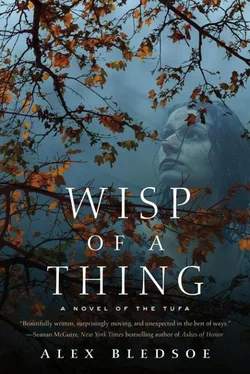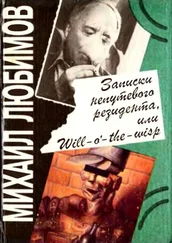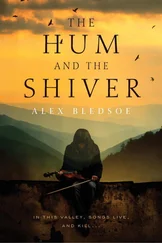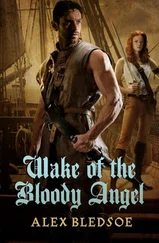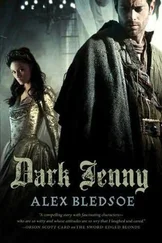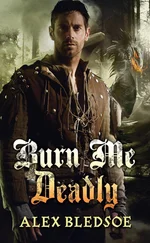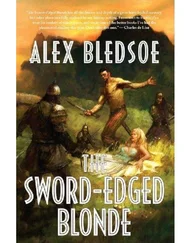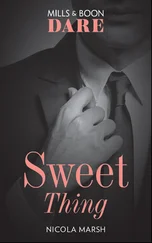The younger man grinned. “How’d it sound like it went? Had her on her knees begging before the door even shut. What are we going to do about her husband?”
“Us? We don’t do anything. She’ll take care of that, once you tell her to, just like she got us those tombstone rubbings.”
“What’s so important about ’em?”
“You don’t be worrying about that. You didn’t look at ’em, did you?”
“Nossir, you told me not to.”
“That’s good. Make sure you don’t. You hear me, boy?”
“Yessir,” Stoney said contritely. “So, uhm… her husband?”
Rockhouse shrugged and spit tobacco into the dirt. “Fella comes up in here, being all nosy and asking questions, something happens. Nobody’ll be surprised. Nobody’ll ask too many questions.”
The door to the shack opened. Stella emerged, fully dressed but with unmistakably ruffled hair. She looked around until she saw Stoney, then gasped as if she’d been wandering in the desert and he was an oasis. “H-honey?” she said meekly.
“Fix your damn hair, will you?” he snapped at her, and she quickly went back inside. He took a long drink of his beer. “She’s a good one, though. Knows a lot of city-girl tricks.”
“Enjoy her while you can.”
“Oh, I will.” He finished his beer, tossed the can into the woods, and went back inside.
Rockhouse began playing “Carolina in the Morning.”
“You’re not bad,” Rob said when she finished the song “See Rock City.”
“Did you expect me to be?” Bliss replied.
“Not at all. I heard you at the roadhouse, remember? So who taught you to play?”
“Mostly my grandfather. He started showing me things when I was about six or seven. Oh, do I remember them snappy black eyes glaring at me when I’d done something wrong or fell back a little bit. But eventually he slowed down and I sped up, and he taught me a lot. What about you?”
“Self-taught. Bought a DVD and sat in my bedroom learning chords and writing songs all through high school. Better than leaving the house and getting beat up.”
“And then you ended up on TV. How did that happen? Unless,” she added quickly, “you’d rather not talk about it.”
“Nah, it’s okay. I had a band. Three other guys, but they were… you know how some people are serious about what they do, but some people just do it because it’s easy and then quit when it turns into work? That was them. Not their fault, but I wanted more. Anyway, whenever I’d complain about how that show just made musicians look stupid and shallow, they’d say I should audition. They were kidding, but one day I was at the mall, the auditions were going on, and I just went in.”
“And you won.”
“Better for everybody if I hadn’t.” He paused. “So what was your first time like?”
“Excuse me?”
“The first time you ever played in public.”
“Oh. Well, let me see. I guess I was about ten years old. I was having a real hard time with the guitar Granddaddy wanted me to play, so Daddy bought me this thing, it was bigger than a ukulele, but smaller than a regular guitar. They called it a tiple; you ever heard of it?”
Rob nodded. Her accent grew stronger when she talked of her family.
“There was a big barn dance coming up,” Bliss continued, “and one of the men who organized it happened to come by the house one day and heard me singing and playing that tiple. He asked me to come down and told me, ‘You don’t have to play but one song.’ And I think I played fifteen songs before they let me off the stage.” She put her hands back on the guitar. “Now let’s play something else.”
As he settled onto the bench across the table from her, she began to play and waited for him to join in. He concentrated on following her melody, and at last he recognized it as an obscure country song called “Calico Plains.” When they finished, he said, “That was great.”
“Yeah,” she agreed. “You’re the first person I’ve met who knows that song.”
“That’s not the Pam Tillis version, is it?”
“No, it’s Matraca Berg’s original, off Lying to the Moon . Bought the cassette at a flea market.”
“She’s great, isn’t she?”
“She’s the real deal. Except she says the name wrong on ‘Appalachian Rain.’ The tradition is that it’s ‘latch,’ like throw an ‘apple atcha, ’ not ‘apple laycha. ’”
“I’ve heard it that way more than the other.”
“That’s true. Maybe eventually that’s how we’ll say it, too. ‘Tradition’ doesn’t mean just passing down the old things, anyway. You also pass down a tradition of creativity, of being alive. Otherwise, it dies on its feet. So I guess if she needs to say it wrong to make the song work, it’s okay.”
“The one song of yours I’ve heard sure isn’t traditional. Sounds like you’re developing your own thing.”
“Oh, I just piddle around with stuff. No one wants anything genuine, anyway. They want the same thing they’ve always heard. Like that TV show of yours. No one cares what the songs are about, as long as the singer can hit the high notes. That sort of thing bores me.”
“The singer, not the song.”
“Who said that?”
“Exactly.”
She looked confused. “What?”
“Sorry, making a joke. Pete Townsend of the Who said that.” He chuckled. “I’m thirsty now.”
“There’s bottled water in the basket. And our food.”
He helped spread the cloth over the table, and they quickly set out her meal. When he bit into the first sandwich, the ham had a deep sugary taste different from any he’d had before. They talked about songs and musicians, and he told her stories of some of the odd people he’d met during his TV tenure.
When they finished eating, she picked up her guitar again. “Okay. This is my favorite Kate Campbell song. And it’s pretty easy to follow, too, so feel free to jump in.”
She began by playing the first verse without singing, so he could pick it up. He got most of it the first time through; as she said, the changes weren’t that complicated. Then she sang:
Tangled vines cover the lattice
They creep and crawl around the house
Nobody lives there
Only ghosts hang around
“This is the chorus,” she said.
I have seen hope and glory fade away
I’ve heard old folks talk of better days
And all that’s left to guard the remains
Are wrought iron fences
“Wow, that’s great,” Rob said as they played the verse again without singing. “Great details.”
“She’s a master of that,” Bliss said. “Now here’s the second verse.”
Sarah Mae bore two children
One died at birth and one at Shiloh
Now they’re on a hill long forgotten
Carved in stone
Rob reached over the table and grabbed the neck of her guitar so hard, his knuckles turned white, silencing the music with a jarring ching! “Why the fuck did you pick this song?” he said, his voice choked.
The rage in his eyes caught her off guard, and she swallowed hard. “I just… we were listening to her in the truck.”
“Yeah, and that was just a fucking coincidence, too, I suppose?”
He got up and came around the table. She scooted away. “Rob, stop it. It’s just a song!”
“That was what he said to me!” he yelled.
“What who said?”
“The man backstage at the Fox! He told me the song I wanted was ‘on a hill, long forgotten, carved in stone’!”
“Rob, I swear, I don’t know anything about that! I just like the song, and—” And it’s been stuck in my head for days, she finished to herself. Now she knew why.
Читать дальше
